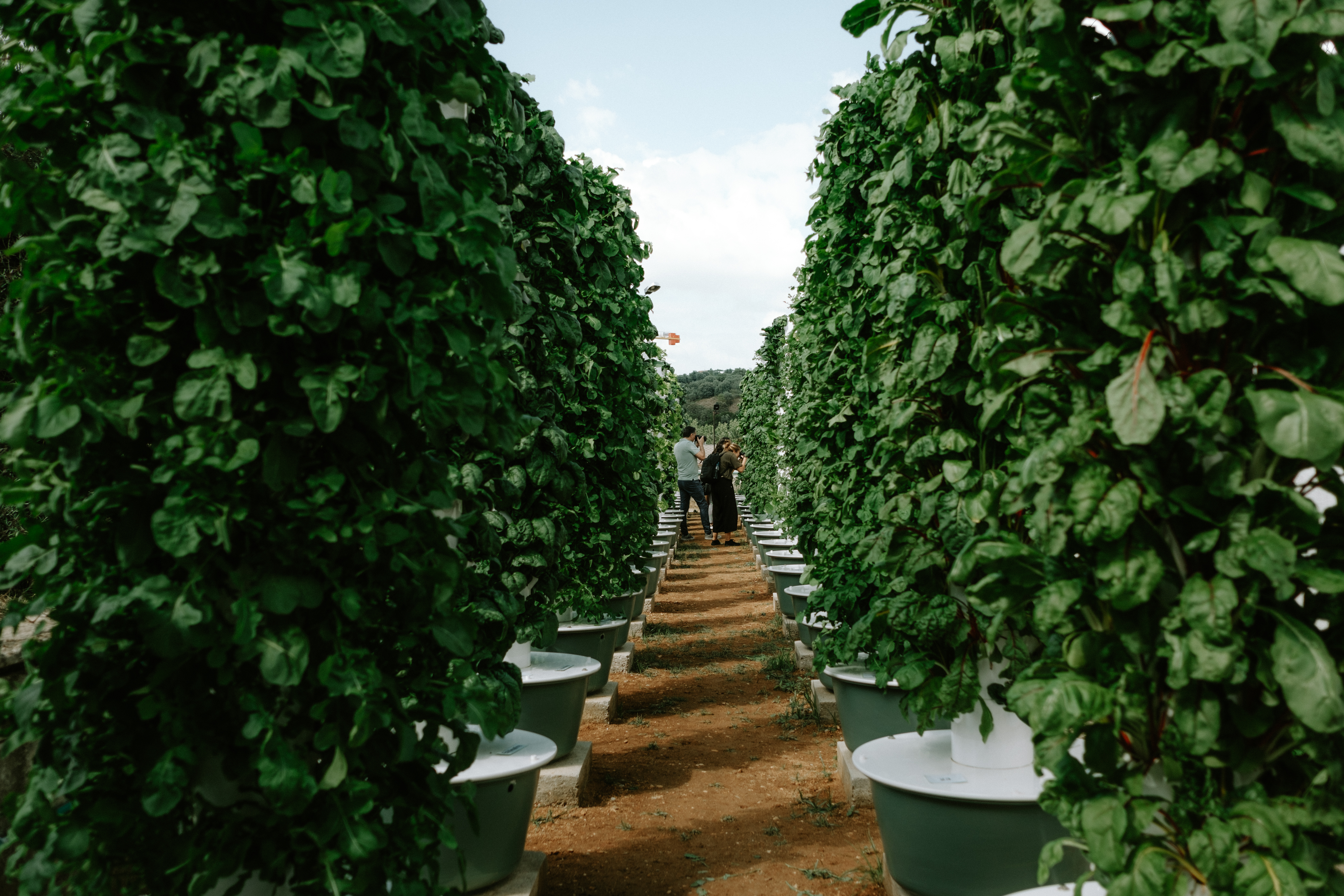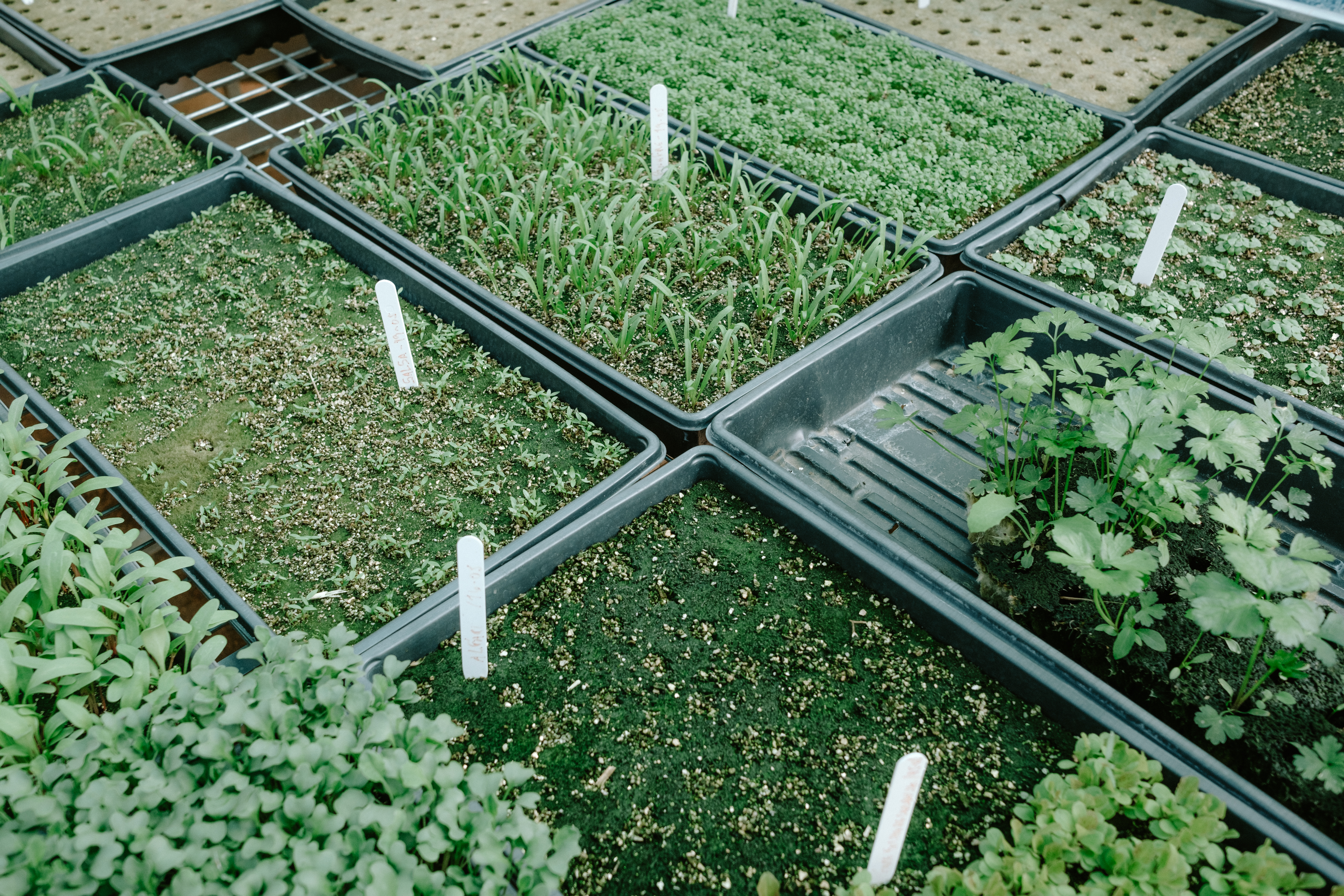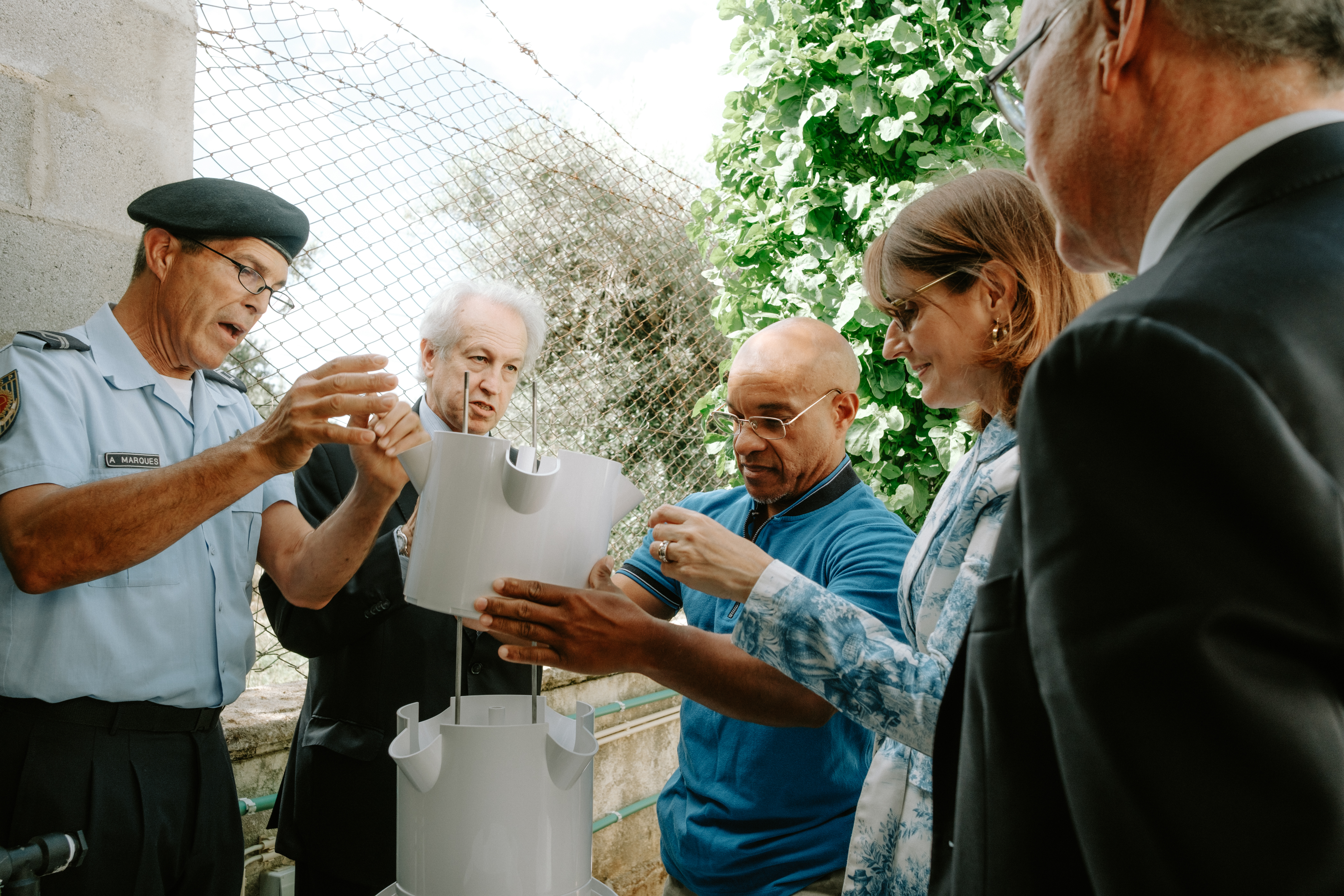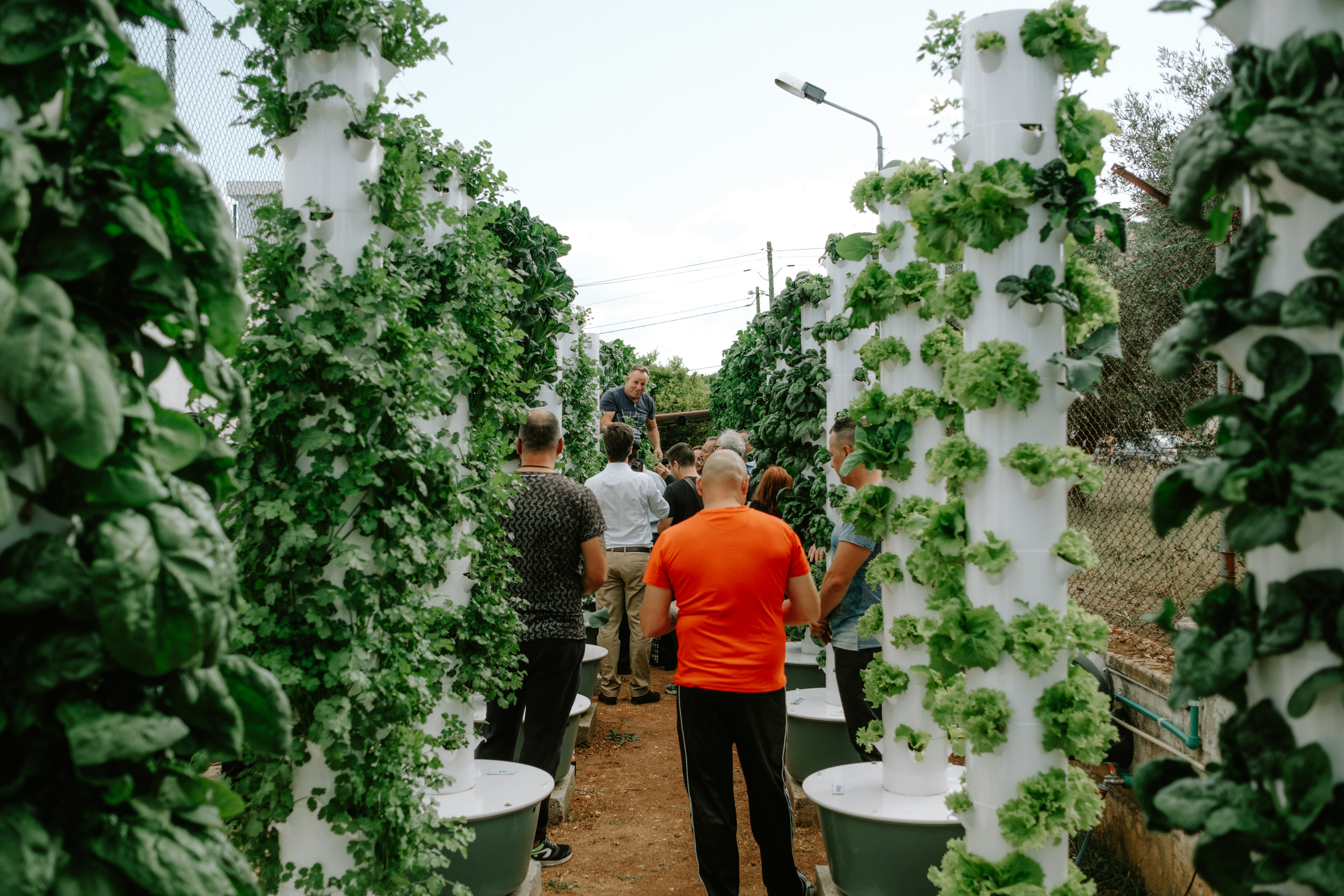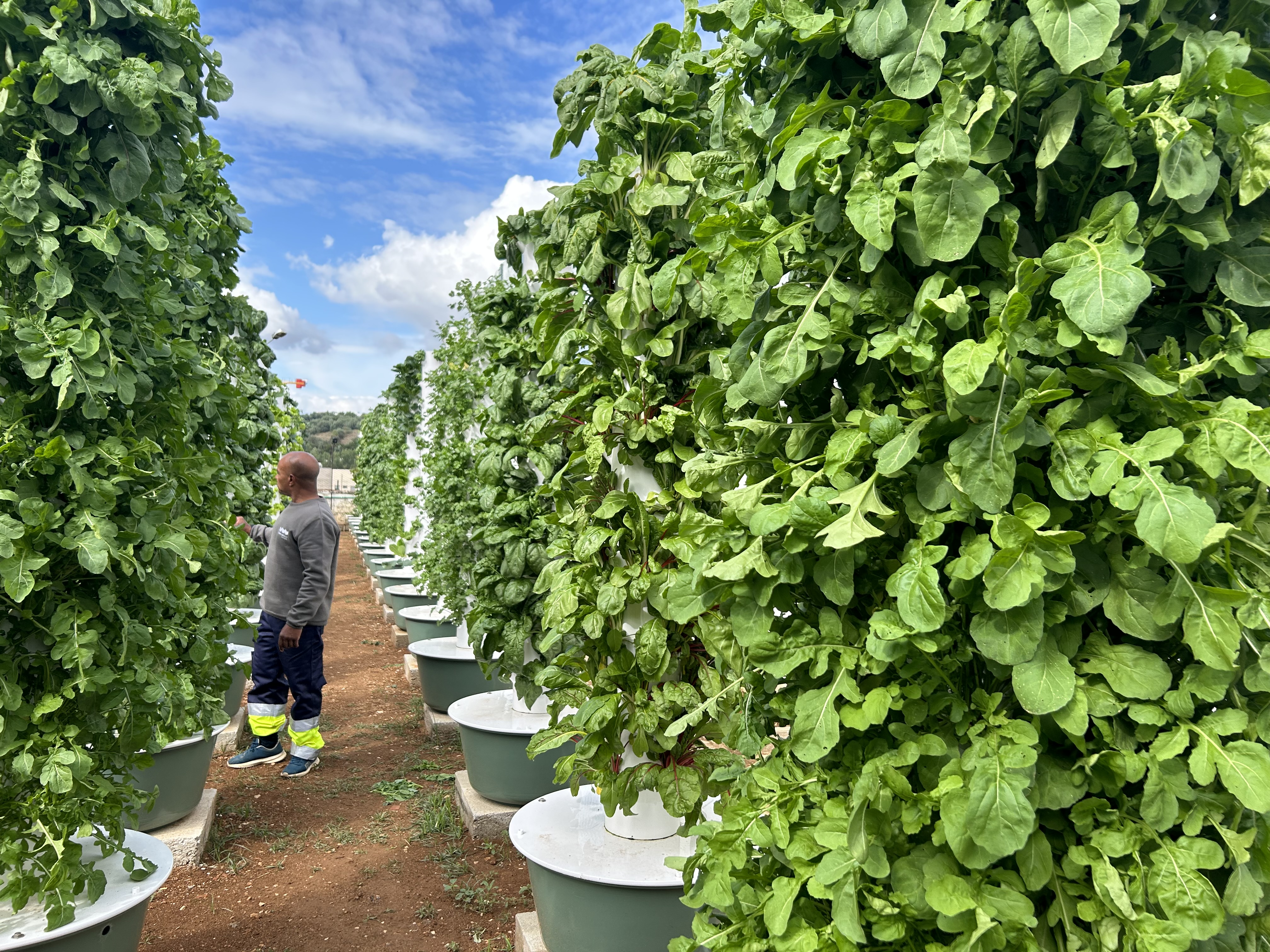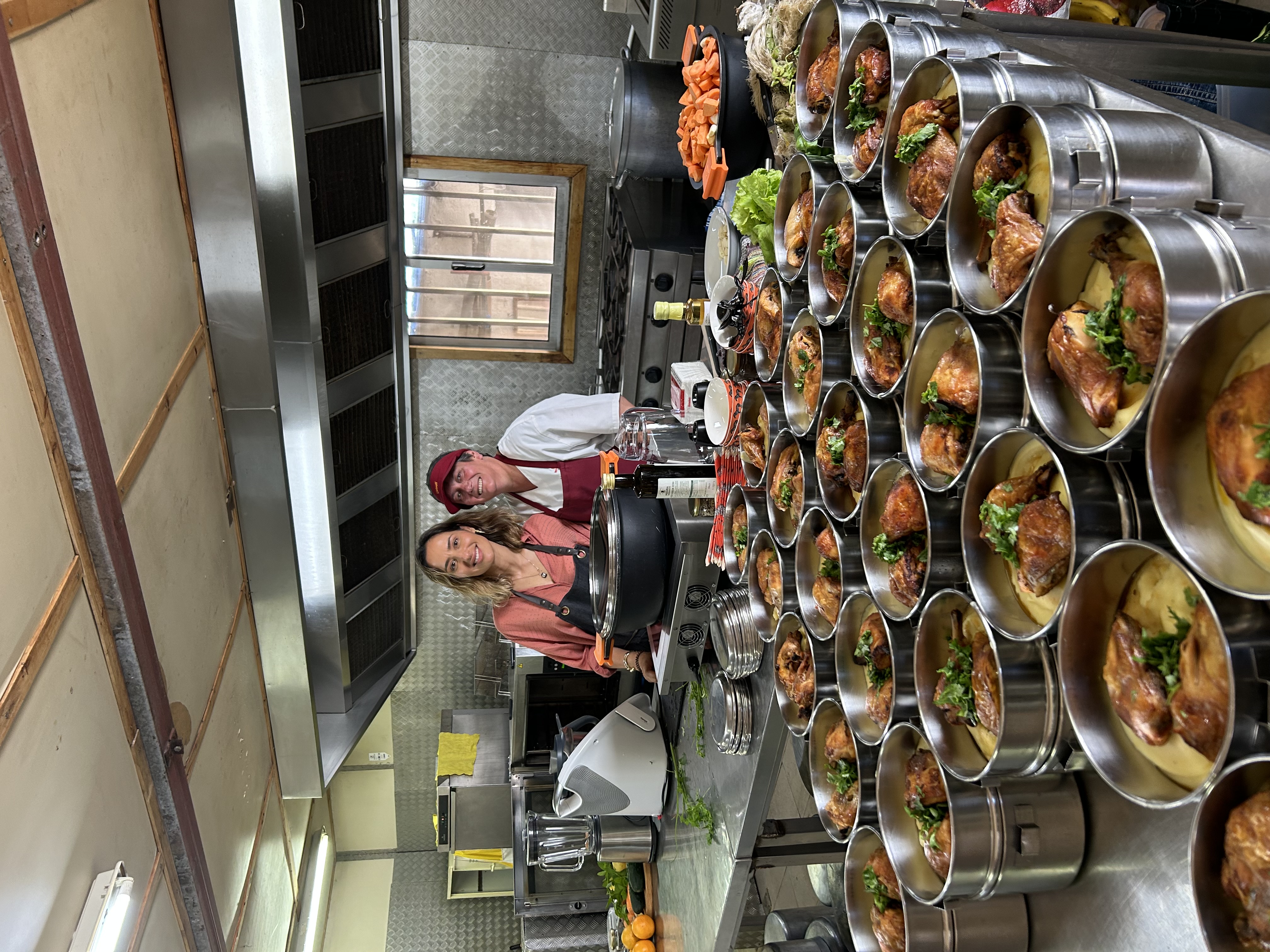Prioritising the places and people that need it the most
Vertical Farming, Horizontal Solidarity
Vertical Farming, Horizontal Solidarity: Regenerating Prisons, Reintegrating Communities
Vertical Farming, Horizontal Solidarity reduces recidivism by combining food production with social reintegration. Through the installation of aeroponic towers, food literacy and social entrepreneurship training, prisoners grow fresh produce for vulnerable families while cultivating new skills and opportunities. This project fosters community regeneration, personal development and sustainability, proving that prisons can be spaces of growth and transformation.
Portugal
Local
Torres Novas, Portugal
Mainly urban
It refers to other types of transformations (soft investment)
Yes
2023-12-31
No
No
No
As a representative of an organisation
Vertical Farming, Horizontal Solidarity aims to reduce criminal recidivism by fostering social reintegration through a comprehensive skills development programme for incarcerated individuals. Currently, the project is fully operational at Torres Novas Prison in Portugal and is expanding to Leiria Youth Prison, targeting young adults aged 16-21.
Aligned with the category ‘Prioritising the places and people that need it most’, the project regenerates individuals by developing both soft and hard skills across four key areas:
(1) Farm Training: Inmates acquire technical skills in agriculture, composting, and permaculture, enhancing self-sufficiency and enriching the prison space with aeroponic towers.
(2) Farm-to-Table Training: Participants prepare nutritious meals using farm-grown products, improving the overall nutritional quality of prison meals and learning about healthy food habits.
(3) Horizontal Solidarity Training: Inmates share produce with vulnerable families, engage in community actions, and develop life projects addressing local needs.
(4) Social Entrepreneurship Training: This area equips inmates with tools to develop solutions for vulnerable communities and build employability skills.
At Torres Novas Prison, 70% of participants completed an ‘Agricultural Technician’ course, gaining skills crucial for sustainable agriculture employment. The project has improved meal quality by incorporating produce from the vertical garden into prison meals. Both inmates and guards were involved in the installation and maintenance of the garden, receiving hands-on training over the course of a year. Monthly solidarity baskets containing 1-2 kg of fresh vegetables were distributed to over 150 vulnerable families. Additionally, 45% of participants actively contributed to community initiatives.
This initiative not only benefits inmates but also strengthens community ties, reduces recidivism, and promotes sustainable, inclusive social impact.
Aligned with the category ‘Prioritising the places and people that need it most’, the project regenerates individuals by developing both soft and hard skills across four key areas:
(1) Farm Training: Inmates acquire technical skills in agriculture, composting, and permaculture, enhancing self-sufficiency and enriching the prison space with aeroponic towers.
(2) Farm-to-Table Training: Participants prepare nutritious meals using farm-grown products, improving the overall nutritional quality of prison meals and learning about healthy food habits.
(3) Horizontal Solidarity Training: Inmates share produce with vulnerable families, engage in community actions, and develop life projects addressing local needs.
(4) Social Entrepreneurship Training: This area equips inmates with tools to develop solutions for vulnerable communities and build employability skills.
At Torres Novas Prison, 70% of participants completed an ‘Agricultural Technician’ course, gaining skills crucial for sustainable agriculture employment. The project has improved meal quality by incorporating produce from the vertical garden into prison meals. Both inmates and guards were involved in the installation and maintenance of the garden, receiving hands-on training over the course of a year. Monthly solidarity baskets containing 1-2 kg of fresh vegetables were distributed to over 150 vulnerable families. Additionally, 45% of participants actively contributed to community initiatives.
This initiative not only benefits inmates but also strengthens community ties, reduces recidivism, and promotes sustainable, inclusive social impact.
Prisons
Social Integration
Community Engagement
Agricultural training
Employability
The Vertical Farming, Horizontal Solidarity project integrates sustainability across environmental, social, and economic dimensions.
Environmental Sustainability: The project introduces 30 aeroponic towers, reducing water consumption by 90% and eliminating soil degradation. Aeroponics conserves natural resources, improves the prison environment, and optimises space, particularly in urban areas where land is scarce. By requiring less space for the same yield compared to traditional farming, the project maximises land efficiency. The farm-to-table approach minimises food waste, transport emissions, and packaging use, fostering a sustainable food chain. A composting area will also be added, creating a circular system and reinforcing ecological balance within the prison.
Social Sustainability: By training inmates in sustainable agriculture, the project equips them with practical, employable skills, lowering the likelihood of recidivism. Participants gain technical knowledge and a sense of responsibility, becoming agents of change and sharing skills with their families upon release.
Economic Sustainability: The project fosters local partnerships, sourcing plants, seeds, and supplies from nearby suppliers, reducing transportation-related carbon footprints. Financial autonomy is prioritised, with the sale of horticultural products providing a revenue stream for long-term sustainability. The Torres Novas project, implemented in 2023, is now operating autonomously, with the prison fully managing the initiative. While Upfarming no longer provides direct support, the prison independently secures local institutional funding and other revenue streams, ensuring the project’s continuity.
This holistic approach to sustainability makes the project exemplary in addressing environmental, social, and economic challenges simultaneously.
Environmental Sustainability: The project introduces 30 aeroponic towers, reducing water consumption by 90% and eliminating soil degradation. Aeroponics conserves natural resources, improves the prison environment, and optimises space, particularly in urban areas where land is scarce. By requiring less space for the same yield compared to traditional farming, the project maximises land efficiency. The farm-to-table approach minimises food waste, transport emissions, and packaging use, fostering a sustainable food chain. A composting area will also be added, creating a circular system and reinforcing ecological balance within the prison.
Social Sustainability: By training inmates in sustainable agriculture, the project equips them with practical, employable skills, lowering the likelihood of recidivism. Participants gain technical knowledge and a sense of responsibility, becoming agents of change and sharing skills with their families upon release.
Economic Sustainability: The project fosters local partnerships, sourcing plants, seeds, and supplies from nearby suppliers, reducing transportation-related carbon footprints. Financial autonomy is prioritised, with the sale of horticultural products providing a revenue stream for long-term sustainability. The Torres Novas project, implemented in 2023, is now operating autonomously, with the prison fully managing the initiative. While Upfarming no longer provides direct support, the prison independently secures local institutional funding and other revenue streams, ensuring the project’s continuity.
This holistic approach to sustainability makes the project exemplary in addressing environmental, social, and economic challenges simultaneously.
This project transforms prison environments into regenerative spaces where nature, people, and learning converge. By introducing vertical farming, the project integrates biophilic elements, creating a visually appealing and therapeutic atmosphere. The aeroponic towers are not only functional but also represent innovation and progress, shifting the prison experience from confinement to personal growth.
The structured training programme provides experiential learning, offering inmates hands-on exposure to agronomy and sustainable food production. Gastronomy training enhances the cultural and sensory aspects of food, helping participants reconnect with nutrition and well-being. Personal and social development activities further boost self-esteem, making the prison experience more constructive and life-changing.
The space also acts as a meeting point for the prison community, including guards, management, health and education technicians, teachers, and maintenance staff. Observing the plants' growth and the aeroponic system fosters curiosity and connection. This interaction boosts inmates' self-esteem as they see the entire community engaged with their work.
The biophilic design, incorporating natural elements and sustainable practices, has been shown to improve mental health and well-being among inmates. Studies suggest such environments can reduce aggression and promote rehabilitation (Söderlund, J., & Newman, P. (2017). Improving Mental Health in Prisons Through Biophilic Design. The Prison Journal, 97(6), 750-772.). By integrating vertical farming and biophilic design, HVSH sets a new standard for rehabilitative environments, fostering personal growth, skill development, and community engagement.
The transformation of the outside area at Torres Novas from a grim, semi-abandoned garden into a beautiful, almost futuristic space highlights the profound aesthetic impact of the project, making the environment more uplifting and inspiring for all involved.
The structured training programme provides experiential learning, offering inmates hands-on exposure to agronomy and sustainable food production. Gastronomy training enhances the cultural and sensory aspects of food, helping participants reconnect with nutrition and well-being. Personal and social development activities further boost self-esteem, making the prison experience more constructive and life-changing.
The space also acts as a meeting point for the prison community, including guards, management, health and education technicians, teachers, and maintenance staff. Observing the plants' growth and the aeroponic system fosters curiosity and connection. This interaction boosts inmates' self-esteem as they see the entire community engaged with their work.
The biophilic design, incorporating natural elements and sustainable practices, has been shown to improve mental health and well-being among inmates. Studies suggest such environments can reduce aggression and promote rehabilitation (Söderlund, J., & Newman, P. (2017). Improving Mental Health in Prisons Through Biophilic Design. The Prison Journal, 97(6), 750-772.). By integrating vertical farming and biophilic design, HVSH sets a new standard for rehabilitative environments, fostering personal growth, skill development, and community engagement.
The transformation of the outside area at Torres Novas from a grim, semi-abandoned garden into a beautiful, almost futuristic space highlights the profound aesthetic impact of the project, making the environment more uplifting and inspiring for all involved.
Vertical Farming, Horizontal Solidarity (HVSH) addresses a fundamental barrier to social reintegration: the low level of education and lack of professional qualifications among prison populations. In Portugal, data from the Directorate-General for Reintegration and Prison Services (DGRSP) indicate that over 75% of inmates have only basic education, with 3.5% unable to read or write. This challenge is common across Europe, where educational deficits and limited vocational training complicate reintegration efforts.
To address this, the HVSH provides an inclusive programme that engages individuals with diverse skills and motivations. We create opportunities for each person to contribute to the project, in their own way. This inclusivity ensures that everyone has a meaningful role. The programme is designed to be accessible, offering a learning environment where inmates from all educational backgrounds can participate. It also includes psychological and emotional support to overcome barriers such as trauma, low self-esteem, and lack of motivation.
The project acknowledges the cultural diversity present in prisons. By creating a safe space and fostering positive relationships with facilitators, we encourage the sharing of different experiences, enriching the overall intervention.
The farm-to-table approach ensures that the prison community has free access to fresh, home-grown food. In Torres Novas, food literacy training was conducted in the prison kitchen, in partnership with the prison cooks. This collaboration allowed the integration of farm-grown vegetables into daily meals, bridging learning with practical application.
Beyond the prison walls, HVSH promotes inclusion by distributing food baskets to vulnerable families, reinforcing solidarity between inmates and the wider community. This fosters a sense of belonging and social responsibility, helping participants redefine their roles within society and creating pathways for their future reintegration.
To address this, the HVSH provides an inclusive programme that engages individuals with diverse skills and motivations. We create opportunities for each person to contribute to the project, in their own way. This inclusivity ensures that everyone has a meaningful role. The programme is designed to be accessible, offering a learning environment where inmates from all educational backgrounds can participate. It also includes psychological and emotional support to overcome barriers such as trauma, low self-esteem, and lack of motivation.
The project acknowledges the cultural diversity present in prisons. By creating a safe space and fostering positive relationships with facilitators, we encourage the sharing of different experiences, enriching the overall intervention.
The farm-to-table approach ensures that the prison community has free access to fresh, home-grown food. In Torres Novas, food literacy training was conducted in the prison kitchen, in partnership with the prison cooks. This collaboration allowed the integration of farm-grown vegetables into daily meals, bridging learning with practical application.
Beyond the prison walls, HVSH promotes inclusion by distributing food baskets to vulnerable families, reinforcing solidarity between inmates and the wider community. This fosters a sense of belonging and social responsibility, helping participants redefine their roles within society and creating pathways for their future reintegration.
Vertical Farming, Horizontal Solidarity (HVSH) is built on community participation, engaging both incarcerated individuals and civil society. By fostering shared responsibility and mutual benefits, HVSH strengthens social reintegration and transforms prison spaces into productive, inspiring environments.
Inmates are co-creators, involved in farming, distribution, and decision-making. In just one year, they cultivated over 1.5 tons of produce, developing responsibility, teamwork, and social awareness. Beyond labor, they received training and contributed ideas to optimize operations. As inmate Lucio Tavares expressed, “It’s like taking care of a child, with love. I feel happy among these plants.” André Casaca added, “Thank you for helping me become a better, more capable person. I will never forget the kindness I received.”
Prison staff also played a key role, shifting from custodial duties to rehabilitation. Officer M. Matos emphasized: “It was good working with the inmates. We’re not just here to open and close doors—we’re here to assist in rehabilitation.”
The local community extended the project’s reach through partnerships with NGOs and organizations like Cáritas and the Red Cross. Over 150 vulnerable families received fresh produce, improving food security. One recipient shared, “A great initiative with strong values.” Cáritas Torres Novas praised the project for enriching families' diets, especially for children and the elderly, with included recipes helping them explore new foods.
NGOs and local businesses further supported training and employment for inmates post-release, ensuring long-term impact. The collaboration between inmates, staff, and society strengthened social bonds, bridging the gap between prison and community.
Through its participatory and inclusive approach, HVSH demonstrates that urban farming can be a powerful tool for rehabilitation, integration, and solidarity.
Inmates are co-creators, involved in farming, distribution, and decision-making. In just one year, they cultivated over 1.5 tons of produce, developing responsibility, teamwork, and social awareness. Beyond labor, they received training and contributed ideas to optimize operations. As inmate Lucio Tavares expressed, “It’s like taking care of a child, with love. I feel happy among these plants.” André Casaca added, “Thank you for helping me become a better, more capable person. I will never forget the kindness I received.”
Prison staff also played a key role, shifting from custodial duties to rehabilitation. Officer M. Matos emphasized: “It was good working with the inmates. We’re not just here to open and close doors—we’re here to assist in rehabilitation.”
The local community extended the project’s reach through partnerships with NGOs and organizations like Cáritas and the Red Cross. Over 150 vulnerable families received fresh produce, improving food security. One recipient shared, “A great initiative with strong values.” Cáritas Torres Novas praised the project for enriching families' diets, especially for children and the elderly, with included recipes helping them explore new foods.
NGOs and local businesses further supported training and employment for inmates post-release, ensuring long-term impact. The collaboration between inmates, staff, and society strengthened social bonds, bridging the gap between prison and community.
Through its participatory and inclusive approach, HVSH demonstrates that urban farming can be a powerful tool for rehabilitation, integration, and solidarity.
HVSH collaborates with stakeholders at multiple levels.
At the local level, municipalities are crucial partners, offering financial support as social investors and helping to drive the project's growth. They promote the initiative through municipal events and communication channels, strengthening its connection to the local community. This partnership provides visibility, knowledge-sharing, and human resources, helping to integrate the project into broader local initiatives.
The General Directorate of Prison Services (DGRSP) plays a vital role, recognizing the positive impact of vertical gardens and influencing public policies. They support the integration of holistic programs and the expansion of the initiative to other prisons, identifying specific needs and raising awareness among prison administrations.
Within prison institutions, local staff, including social reintegration officers, educators, and prison guards, ensure the project's operational success. Their collaboration enables a holistic approach to inmate training and development.
Regional agricultural cooperatives and companies are essential to the project's sustainability, providing key materials like seeds and nutrients. These partners not only contribute products but also engage emotionally with the project.
Universities and academic institutions validate the impact measurement and provide scientific insights to optimize the program. Their involvement integrates best practices and innovative approaches, as well as rigorous impact assessments.
NGOs working with vulnerable families play a critical role in ensuring the effective distribution of fresh produce. They identify families in need, preventing duplication of efforts and ensuring the project reaches those who benefit the most.
Finally, experts from various fields (chefs, biologists, and professionals in entrepreneurship and permaculture) enrich the project with multidisciplinary perspectives.
At the local level, municipalities are crucial partners, offering financial support as social investors and helping to drive the project's growth. They promote the initiative through municipal events and communication channels, strengthening its connection to the local community. This partnership provides visibility, knowledge-sharing, and human resources, helping to integrate the project into broader local initiatives.
The General Directorate of Prison Services (DGRSP) plays a vital role, recognizing the positive impact of vertical gardens and influencing public policies. They support the integration of holistic programs and the expansion of the initiative to other prisons, identifying specific needs and raising awareness among prison administrations.
Within prison institutions, local staff, including social reintegration officers, educators, and prison guards, ensure the project's operational success. Their collaboration enables a holistic approach to inmate training and development.
Regional agricultural cooperatives and companies are essential to the project's sustainability, providing key materials like seeds and nutrients. These partners not only contribute products but also engage emotionally with the project.
Universities and academic institutions validate the impact measurement and provide scientific insights to optimize the program. Their involvement integrates best practices and innovative approaches, as well as rigorous impact assessments.
NGOs working with vulnerable families play a critical role in ensuring the effective distribution of fresh produce. They identify families in need, preventing duplication of efforts and ensuring the project reaches those who benefit the most.
Finally, experts from various fields (chefs, biologists, and professionals in entrepreneurship and permaculture) enrich the project with multidisciplinary perspectives.
HVSH project is built on a multidisciplinary approach, integrating knowledge from agriculture, psychology, education, nutrition, social entrepreneurship, and environmental sustainability to create a holistic rehabilitation and reintegration model. By combining expertise from these fields, HVSH maximizes its impact, equipping inmates with technical, social, and emotional skills essential for a successful return to society.
Experts in agriculture and environmental sustainability played a key role in designing the vertical aeroponic farming system, ensuring efficient resource use and sustainable food production in a confined space. This was complemented by psychologists and social scientists, who applied principles from Logotherapy (Frankl), Ecopsychology, and Cognitive-Behavioral approaches to support inmates in developing self-awareness, emotional regulation, and a sense of purpose.
Education specialists structured the learning process based on Kolb’s Experiential Learning Cycle and Cooperative Learning (Johnson & Johnson, 1991), ensuring that inmates engaged in interactive and practical training. Meanwhile, nutritionists and public health experts contributed to the Farm-to-Table component, improving food literacy and prison meal quality, addressing nutritional gaps and promoting healthier eating habits.
The social entrepreneurship and employability component was led by specialists in business development and vocational training, equipping inmates with entrepreneurial skills and pathways to employment in sustainable agriculture or small-scale businesses.
This interdisciplinary collaboration allowed HVSH to merge scientific knowledge with hands-on experience, ensuring that technical training, psychological support, and social responsibility were deeply interconnected.
Experts in agriculture and environmental sustainability played a key role in designing the vertical aeroponic farming system, ensuring efficient resource use and sustainable food production in a confined space. This was complemented by psychologists and social scientists, who applied principles from Logotherapy (Frankl), Ecopsychology, and Cognitive-Behavioral approaches to support inmates in developing self-awareness, emotional regulation, and a sense of purpose.
Education specialists structured the learning process based on Kolb’s Experiential Learning Cycle and Cooperative Learning (Johnson & Johnson, 1991), ensuring that inmates engaged in interactive and practical training. Meanwhile, nutritionists and public health experts contributed to the Farm-to-Table component, improving food literacy and prison meal quality, addressing nutritional gaps and promoting healthier eating habits.
The social entrepreneurship and employability component was led by specialists in business development and vocational training, equipping inmates with entrepreneurial skills and pathways to employment in sustainable agriculture or small-scale businesses.
This interdisciplinary collaboration allowed HVSH to merge scientific knowledge with hands-on experience, ensuring that technical training, psychological support, and social responsibility were deeply interconnected.
Unlike traditional prison work programs, HVSH stands out as a pioneering initiative that merges cutting-edge aeroponic technology with a structured social reintegration model.
A key innovation of HVSH is the integration of vertical aeroponic farming within the prison environment, an unprecedented approach in Portugal. This system, based on modular aeroponic growing towers, allows for efficient, soil-free cultivation, optimizing space, resource efficiency, and crop diversity. The aeroponic method delivers nutrients directly to plant roots, resulting in significant water conservation—a crucial factor in sustainable agriculture, particularly in water-scarce regions.
Beyond the technological breakthrough, HVSH adopts a systemic and dynamic methodology, moving away from conventional educational approaches. By thematically structuring learning through hands-on projects, the program adapts to the unique needs of each inmate, creating an engaging, motivational, and transformative experience. This method effectively addresses educational gaps that many incarcerated individuals face, particularly those from vulnerable backgrounds who have experienced academic disengagement.
HVSH also plays a critical role in tackling youth unemployment and social reintegration. By providing practical, employable skills in a sector facing labor shortages, the project bridges the gap between correctional rehabilitation and workforce demand. This aligns with broader societal trends, mirroring Portugal’s digital transformation efforts by modernizing agriculture through urban and vertical farming techniques.
Furthermore, the project has a direct impact on food security. By promoting the consumption of fresh, locally grown produce, HVSH enhances the nutritional quality of meals provided to inmates, replacing reliance on processed and low-nutrient food often distributed in institutional settings. This contributes to public health goals, aligning with WHO recommendations on dietary improvement.
A key innovation of HVSH is the integration of vertical aeroponic farming within the prison environment, an unprecedented approach in Portugal. This system, based on modular aeroponic growing towers, allows for efficient, soil-free cultivation, optimizing space, resource efficiency, and crop diversity. The aeroponic method delivers nutrients directly to plant roots, resulting in significant water conservation—a crucial factor in sustainable agriculture, particularly in water-scarce regions.
Beyond the technological breakthrough, HVSH adopts a systemic and dynamic methodology, moving away from conventional educational approaches. By thematically structuring learning through hands-on projects, the program adapts to the unique needs of each inmate, creating an engaging, motivational, and transformative experience. This method effectively addresses educational gaps that many incarcerated individuals face, particularly those from vulnerable backgrounds who have experienced academic disengagement.
HVSH also plays a critical role in tackling youth unemployment and social reintegration. By providing practical, employable skills in a sector facing labor shortages, the project bridges the gap between correctional rehabilitation and workforce demand. This aligns with broader societal trends, mirroring Portugal’s digital transformation efforts by modernizing agriculture through urban and vertical farming techniques.
Furthermore, the project has a direct impact on food security. By promoting the consumption of fresh, locally grown produce, HVSH enhances the nutritional quality of meals provided to inmates, replacing reliance on processed and low-nutrient food often distributed in institutional settings. This contributes to public health goals, aligning with WHO recommendations on dietary improvement.
HVSH project employs an experiential, skills-based methodology designed to reduce recidivism and foster social reintegration. Initially implemented at Torres Novas Prison and expanding to Leiria Youth Prison, rooted in Kolb’s Experiential Learning Theory, the methodology follows a continuous learning cycle. Inmates begin by directly engaging in vertical aeroponic farming, followed by reflecting on their challenges and progress. Structured workshops encourage participants to analyze their experiences and explore future employment opportunities, before applying their new skills in real-world settings, such as meal preparation, distributing solidarity baskets, and engaging in entrepreneurial projects. Additionally, the project applies Cooperative Learning (Johnson & Johnson, 1991), emphasizing teamwork, responsibility, and problem-solving, which are crucial for long-term reintegration.
HVSH is organized around four complementary training areas: [1]Farm Training;[2]Farm-to-Table Training;[3]Horizontal Solidarity Training,;[4]Social Entrepreneurship Training.
Beyond technical skill development, the project integrates a psychosocial approach inspired by Frankl’s Logotherapy, emphasizing self-transcendence and purpose-driven rehabilitation. Inmates engage in meaningful work, shifting their focus from past mistakes to future contributions to society. The methodology also draws from Biophilia Theory (Joye & De Block, 2011; Kahn, 1997), using nature’s restorative power to promote mental well-being, emotional balance, and social reintegration.
The project’s impact is significant: 70% of participants completed an Agricultural Operator course, increasing their employment prospects; 150 families received monthly solidarity baskets of fresh produce; and 45% of inmates engaged in community initiatives, enhancing social responsibility and civic engagement.
HVSH is organized around four complementary training areas: [1]Farm Training;[2]Farm-to-Table Training;[3]Horizontal Solidarity Training,;[4]Social Entrepreneurship Training.
Beyond technical skill development, the project integrates a psychosocial approach inspired by Frankl’s Logotherapy, emphasizing self-transcendence and purpose-driven rehabilitation. Inmates engage in meaningful work, shifting their focus from past mistakes to future contributions to society. The methodology also draws from Biophilia Theory (Joye & De Block, 2011; Kahn, 1997), using nature’s restorative power to promote mental well-being, emotional balance, and social reintegration.
The project’s impact is significant: 70% of participants completed an Agricultural Operator course, increasing their employment prospects; 150 families received monthly solidarity baskets of fresh produce; and 45% of inmates engaged in community initiatives, enhancing social responsibility and civic engagement.
The HVSH project, initially implemented in Torres Novas Prison (EPTN) in 2023, has proven to be successful and is now in its third year of operation. The project is now under the autonomous management of EPTN and the Municipality of Torres Novas, while also being expanded to Leiria Youth Prison (EPLJ) from 2024 to 2027. The General Directorate of Reintegration and Prison Services and the Ministry of Justice have expressed strong support for the project, and we are planning to extend it across more prisons in Portugal. A five-year expansion plan has been developed: Phase 1 (2026-2029) will target 20 prisons on the mainland, reaching approximately 50% of Portugal's prisons; Phase 2 (>2030) will cover the remaining of the inland prisons plus the 4 prisons in the islands, achieving 100% coverage. Each region will have a team of an agronomist and a psychologist to ensure localized and effective interventions.
Internationally, the HVSH methodology has the potential to be implemented across Europe and beyond. Low levels of education and lack of technical skills are widespread issues for incarcerated individuals. This common challenge makes the HVSH model highly transferable to prisons across the EU, where criminal recidivism rates can exceed 50% in some countries, as highlighted by a 2017 European Parliament report. The flexibility of the vertical farming model and the adaptable educational approach also make it relevant for rehabilitation centers and marginalized communities outside the prison system.
Upfarming is applying its model in schools, hospitals and social neighborhoods. The modular nature of vertical farming allows the system to be easily scaled and adapted to different contexts.
By documenting best practices, HVSH offers a blueprint for replication and scaling in different contexts, providing a roadmap for similar initiatives worldwide. This approach not only addresses local challenges but also fosters broader social and environmental sustainability.
Internationally, the HVSH methodology has the potential to be implemented across Europe and beyond. Low levels of education and lack of technical skills are widespread issues for incarcerated individuals. This common challenge makes the HVSH model highly transferable to prisons across the EU, where criminal recidivism rates can exceed 50% in some countries, as highlighted by a 2017 European Parliament report. The flexibility of the vertical farming model and the adaptable educational approach also make it relevant for rehabilitation centers and marginalized communities outside the prison system.
Upfarming is applying its model in schools, hospitals and social neighborhoods. The modular nature of vertical farming allows the system to be easily scaled and adapted to different contexts.
By documenting best practices, HVSH offers a blueprint for replication and scaling in different contexts, providing a roadmap for similar initiatives worldwide. This approach not only addresses local challenges but also fosters broader social and environmental sustainability.
HVSH addresses pressing global challenges such as unemployment, food insecurity, and social exclusion by providing local solutions that empower incarcerated individuals and support community well-being.The project’s certified training in sustainable agriculture, including workshops on composting and permaculture, aligns with key strategic objectives of the European Union, specifically the Common Agricultural Policy. These include:
Agricultural Vocational Education and Training: The EU highlights the importance of education and training for farmers. The European Parliament’s 2017 report on Agricultural Education and Lifelong Training emphasizes knowledge transfer, ensuring that individuals acquire the necessary skills to improve efficiency, sustainability, and adaptability in response to climate change.
Skills for Sustainable Agriculture: The EU promotes sustainable agricultural practices through the European Green Deal and the Farm to Fork Strategy. HVSH contributes to these efforts by training participants in organic farming, climate-resilient agriculture, and agroecology, directly supporting environmental sustainability and reducing agriculture’s environmental footprint.
Additionally, the project contributes to the United Nations Sustainable Development Goals:
SDG1– No Poverty: By strengthening the resilience of young prisoners, the project helps reduce poverty and social exclusion.
SDG2– Zero Hunger and Sustainable Agriculture: The focus on vertical farming enhances food security and promotes sustainable agricultural practices, addressing hunger at both local and global levels.
SDG10– Reduced Inequalities: By promoting social inclusion and developing employability skills, HVSH actively contributes to reducing inequalities among marginalized populations.
In addressing these global challenges with local, sustainable solutions, HVSH not only enhances the lives of individuals in prison but also contributes to broader environmental and social goals.
Agricultural Vocational Education and Training: The EU highlights the importance of education and training for farmers. The European Parliament’s 2017 report on Agricultural Education and Lifelong Training emphasizes knowledge transfer, ensuring that individuals acquire the necessary skills to improve efficiency, sustainability, and adaptability in response to climate change.
Skills for Sustainable Agriculture: The EU promotes sustainable agricultural practices through the European Green Deal and the Farm to Fork Strategy. HVSH contributes to these efforts by training participants in organic farming, climate-resilient agriculture, and agroecology, directly supporting environmental sustainability and reducing agriculture’s environmental footprint.
Additionally, the project contributes to the United Nations Sustainable Development Goals:
SDG1– No Poverty: By strengthening the resilience of young prisoners, the project helps reduce poverty and social exclusion.
SDG2– Zero Hunger and Sustainable Agriculture: The focus on vertical farming enhances food security and promotes sustainable agricultural practices, addressing hunger at both local and global levels.
SDG10– Reduced Inequalities: By promoting social inclusion and developing employability skills, HVSH actively contributes to reducing inequalities among marginalized populations.
In addressing these global challenges with local, sustainable solutions, HVSH not only enhances the lives of individuals in prison but also contributes to broader environmental and social goals.
Our project, focused on combating the social exclusion of the inmate population through training in sustainable agriculture, has shown significant results in multiple areas. One of the main objectives was to train inmates in sustainable agriculture, aiming at their reintegration into society. Out of 30 enrolled inmates, 27 successfully completed the certified training, resulting in a 90% pass rate, higher than expected.
The installation of a vertical farm within the prison had a positive impact on the nutritional quality of meals, with a monthly vegetable harvest 66% higher than anticipated, ensuring all inmates had access to the recommended daily intake. This not only improved access to nutritious food but also promoted sustainable agricultural practices within the prison system.
Our support for vulnerable families through vegetable basket distribution exceeded our target, reaching about 175 families over 8 months. Despite challenges like technological changes affecting distribution frequency, we fulfilled our commitment to supporting these communities.
Beyond tangible results, the project fostered behavioral change and raised awareness, improving food and environmental literacy among inmates and families. Our media campaign and participation in local events enhanced interaction between beneficiaries and the broader community. With over 30 TV appearances, media articles, and a strong social media presence, we amplified the impact of our work. One viral post about the prison farm reached an audience of 2.6 million.
The project also received important recognitions: BPI Fundación "la Caixa" Solidarity Award 2022, recognized as a best practice example at the 55th session of the UN Human Rights Council in 2024, and winner of the Europris Award 2024. In summary, our project demonstrates a strong commitment to social inclusion, environmental sustainability, and the health and well-being of vulnerable communities.
The installation of a vertical farm within the prison had a positive impact on the nutritional quality of meals, with a monthly vegetable harvest 66% higher than anticipated, ensuring all inmates had access to the recommended daily intake. This not only improved access to nutritious food but also promoted sustainable agricultural practices within the prison system.
Our support for vulnerable families through vegetable basket distribution exceeded our target, reaching about 175 families over 8 months. Despite challenges like technological changes affecting distribution frequency, we fulfilled our commitment to supporting these communities.
Beyond tangible results, the project fostered behavioral change and raised awareness, improving food and environmental literacy among inmates and families. Our media campaign and participation in local events enhanced interaction between beneficiaries and the broader community. With over 30 TV appearances, media articles, and a strong social media presence, we amplified the impact of our work. One viral post about the prison farm reached an audience of 2.6 million.
The project also received important recognitions: BPI Fundación "la Caixa" Solidarity Award 2022, recognized as a best practice example at the 55th session of the UN Human Rights Council in 2024, and winner of the Europris Award 2024. In summary, our project demonstrates a strong commitment to social inclusion, environmental sustainability, and the health and well-being of vulnerable communities.

